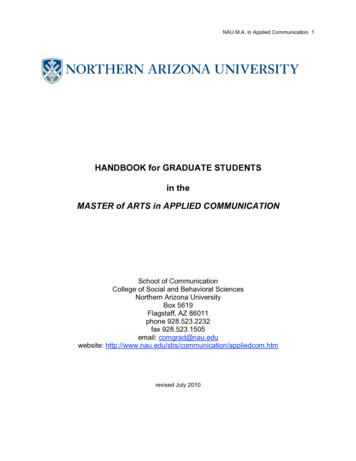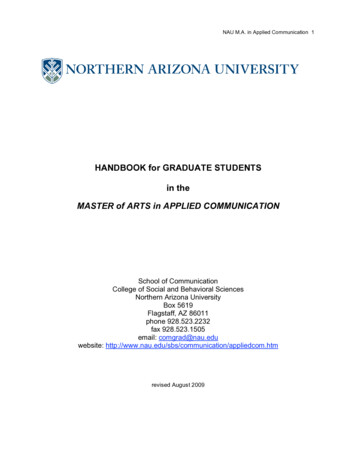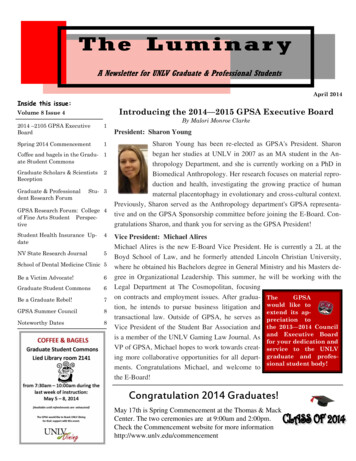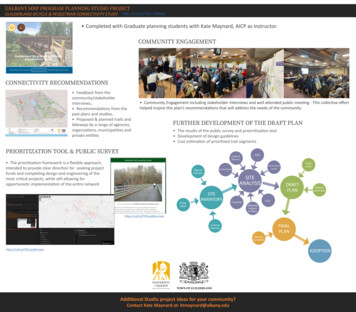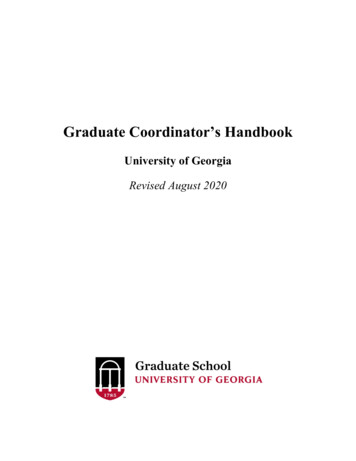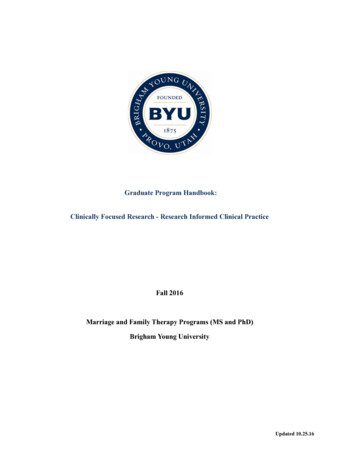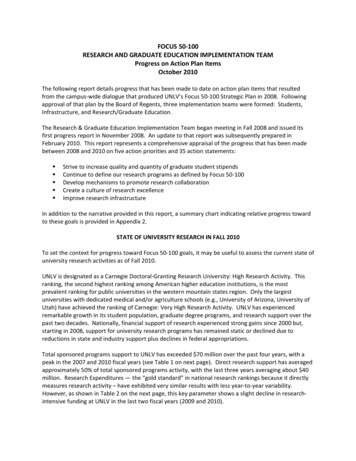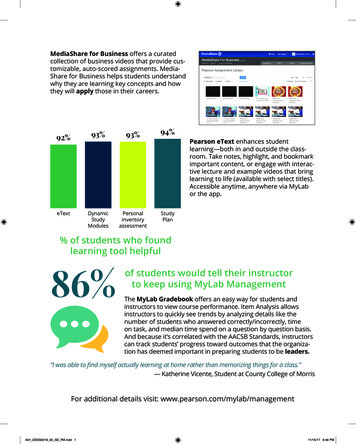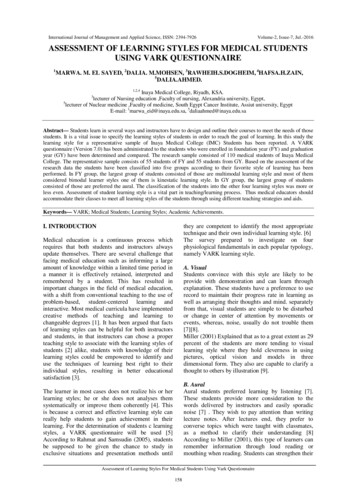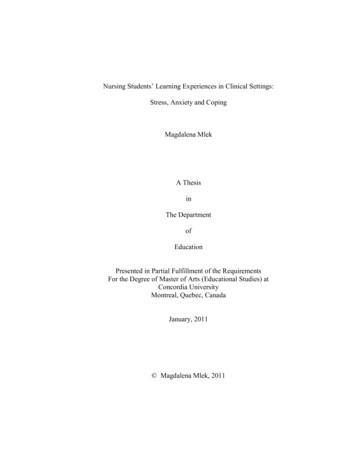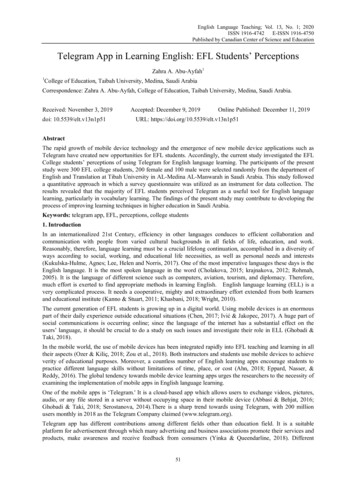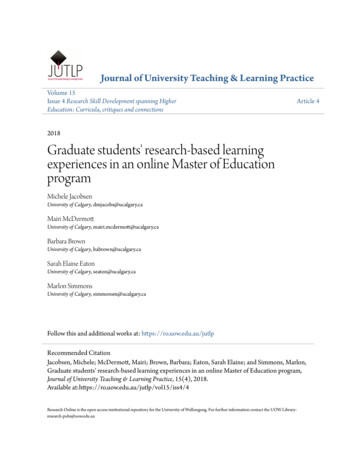
Transcription
Journal of University Teaching & Learning PracticeVolume 15Issue 4 Research Skill Development spanning HigherEducation: Curricula, critiques and connectionsArticle 42018Graduate students' research-based learningexperiences in an online Master of EducationprogramMichele JacobsenUniversity of Calgary, dmjacobs@ucalgary.caMairi McDermottUniversity of Calgary, mairi.mcdermott@ucalgary.caBarbara BrownUniversity of Calgary, babrown@ucalgary.caSarah Elaine EatonUniversity of Calgary, seaton@ucalgary.caMarlon SimmonsUniversity of Calgary, simmonsm@ucalgary.caFollow this and additional works at: https://ro.uow.edu.au/jutlpRecommended CitationJacobsen, Michele; McDermott, Mairi; Brown, Barbara; Eaton, Sarah Elaine; and Simmons, Marlon,Graduate students' research-based learning experiences in an online Master of Education program,Journal of University Teaching & Learning Practice, 15(4), 2018.Available h Online is the open access institutional repository for the University of Wollongong. For further information contact the UOW Library:research-pubs@uow.edu.au
Graduate students' research-based learning experiences in an onlineMaster of Education programAbstractThe purpose of this research was to better understand graduate students' learning experiences in a researchintensive, online Master of Education (MEd) program. In alignment with the program goal for graduatescholars of the profession, this course-based program adopted an inquiry-based signature pedagogy groundedin the innovative practice of research-based learning. As part of this study, we explored broader programstructures, including the cohort-based model, course sequencing and research ethics approval processes,which situate the research-based learning experiences. Several research questions framed our investigationinto the experiences of online students who are engaged in a research-active MEd program. Analysis of surveyand focus group information contributes to this mixed-methods case study and provides insights intoimplications for research-based learning in online course-based graduate programs.KeywordsResearch-based learning, graduate education, case study, online Master of Education degreeThis journal article is available in Journal of University Teaching & Learning Practice: https://ro.uow.edu.au/jutlp/vol15/iss4/4
Jacobsen et al.: Graduate students' research-based learning experiencesIntroductionProfessional master’s and doctoral degrees are a growth area in graduate programs in educationglobally. Over the past century, the steady increase in our understanding of learning, teaching andleadership from an expanded educational research base has been matched by an increase in thediverse competencies needed by those who aim to become outstanding educators (Willis, Inman &Valenti 2010). School leadership requirements grew from teaching experience plus bachelor’sdegree to a master’s degree. School and jurisdiction leaders increasingly return to the university toearn a professional doctorate with the goal of leading scholarship in professional practice. Willis,Inman and Valenti (2010) indicate the pattern of increased professional degree requirementsreflects both the growth and maturation of the educational research base, as well as the expansionof competencies needed by the profession to address the complex learning problems, needs andcontexts involved in education.Online and blended professional graduate programs in educational psychology and educationalresearch are offered at the University of Calgary’s Werklund School of Education (WSE).Master’s and doctoral programs are intentionally designed as cohort-based learning experiencesthat emphasise field-based, practitioner-led research to inform innovation and change in practice.Based on the University of Calgary’s quality assurance principles and guidelines (University ofCalgary 2015), the WSE undertook a curriculum review (CR) of all course-based professionalgraduate programs in 2014-2015. The program-wide CR yielded rich insights on current programstrengths and areas calling for ongoing improvement (Lock, Jacobsen & Brandon 2015). Actionsarising from the CR inform ongoing development, redesign and research efforts by academicfaculty to continually respond to and improve students' engagement and learning experiences. Thispaper presents outcomes of a case study on CR.The authors sought to understand engaged and inspired learning and the use of signaturepedagogies (Shulman 2005; 2007) in practitioner-oriented, professional graduate programs.Signature pedagogies, such as inquiry and problem-based learning, are discipline-focusedapproaches to teaching and learning that intentionally support students in cultivating habits ofbeing, or dispositions towards inquiry in the field (Shulman 2005; 2007). Our school is committedto fostering signature pedagogies across our various undergraduate and graduate programs,including case-based, inquiry-based, problem-based, collaboratory and cognitive apprenticeshipapproaches to learning in and for the profession. In the development and sequencing of fourrequired research courses in our Master of Education (MEd) programs, we have enacted researchbased learning (RBL) (Willison & O'Regan 2006/2018; see the first article in this issue; Willison& Buisman-Pijlman 2016) as an approach to cultivating scholars of the profession: educationalleaders who draw upon and contribute to research in the implementation and assessment ofchanges in education (Walker et al. 2008).What these signature pedagogies have in common is that students are presented with a challengeand then learning is scaffolded in graduated ways with what they need to know and do in order toaddress that challenge. In particular, through the four research courses required for completing acourse-based MEd degree at the WSE (Figure 1), students learn about educational research andprogram evaluation, design and conduct a research study that can involve human participants,report on the outcomes of the research, and prepare a manuscript for publication or presentationbased on findings from their research, in order to develop competence as graduates.1
Journal of University Teaching & Learning Practice, Vol. 15 [2018], Iss. 4, Art. 4Figure 1. A descriptive model showing how the WSE teaches educational research across fourrequired research courses (from Jacobsen, Eaton, Brown, Simmons & McDermott 2018).Graduate CompetenciesCompetencies are an “interrelated set of attitudes, skills and knowledge that are drawn upon andapplied to a particular context for successful learning and living, [and] are developed over time”(Alberta Education 2015, p. 3). The graduate competencies used by WSE in program development(Lock, Jacobsen & Brandon 2015) were adapted from the Council of Ministers of Education's(2007) Ministerial Statement on Quality Assurance of Degree Education in Canada. Graduatecourses and programs are structured around competencies that inform the design of rigorous andrelevant learning experiences. The nine competencies that inform design of WSE graduateprograms align and cohere with the facets of research in the Research Skills Development (RSD)framework (Willison 2014; Table 1). The four research courses required to complete the MEdalign with the practice of RBL whereby students move along a continuum of learning andincreased autonomy in educational research supported by “research-oriented-teaching” (Griffiths2004). Students develop professional competencies (Table 1) while working online and in cohorts(Hurst, Cleveland-Innes & Hawranik 2013).https://ro.uow.edu.au/jutlp/vol15/iss4/42
Jacobsen et al.: Graduate students' research-based learning experiencesTable 1. Graduate competencies mapped to RSD framework facets of research.Werklund School of Education NineGraduate Competencies1. Foster understanding of a substantialbody of knowledge at the forefront ofthe academic discipline2. Acquire interdisciplinary academiccompetencies3. Develop knowledge of educationalresearch methodologies and practices4. Recognise the contributions of otherinterpretations, methods and disciplines5. Engage in the application of knowledge6. Foster an increased awareness of thelimits of knowledge7. Engage in an interdisciplinarycommunity of scholars8. Develop communications for themobilization of knowledge9. Foster professional capacity andautonomySix Facets of Research (Willison 2014)1.Embark on inquiry and so determine aneed for knowledge/understanding2.Find/generate needed information/datausing appropriate methodologyCritically evaluate information/data andthe process to find/generate them3.4.5.6.Organise informationcollected/generatedSynthesise/analyse new knowledgeCommunicate knowledge andunderstanding and the processes used togenerate themMaster of Education Program DescriptionMEd students are guided in carrying out applied or field research on problems of practice theyidentify. In analyzing our student body and the current state of the profession, WSE created twodistinct pathways: 1) MEd Specialist route, and 2) MEd Interdisciplinary route, both of whichprovide students with a systematic understanding of knowledge, a critical awareness of currentproblems and/or new insights at the forefront of their academic discipline and area of professionalpractice. The MEd Specialist is a two-year program with 12 half-courses (36 credits), eightspecialization and four research courses, within one field of study. The MEd Interdisciplinaryprogram consists of 12 half-courses (36 credits) completed in three steps: graduate certificate (fourspecialised courses), graduate diploma (four specialised courses) and MEd Research (four requiredresearch courses) (Jacobsen, Eaton, Brown, Simmons & McDermott 2018).MEd students work online in cohorts, which is a characteristic feature of our program guided byliterature on communities of practice, participatory knowledge building and signature pedagogies(Lave & Wenger 2000; Scardamalia & Bereiter 2006; Shulman 2005). The cohort, an intact groupof students who take a set or all courses in a program together, is integral to the design andteaching of our professional graduate degrees. The cohort design assumes students start and end atthe same time, and progress through a coherent and intentionally designed and structured programof study in which each course builds on previous coursework. The cohort enables graduatestudents to engage in sustained academic and practitioner-scholar dialogues within a learningcommunity that develops over time. Our program’s commitment to cohort-based learning buildsupon research that demonstrates how belonging to a community of learners improves studentexperience and outcomes in professional graduate programs (Anderson 2003; Garrison, Anderson& Archer 2000; Rourke & Anderson 2002; Scardamalia 2002).3
Journal of University Teaching & Learning Practice, Vol. 15 [2018], Iss. 4, Art. 4The cohort is particularly crucial in the online learning experience within which developingcommunity and a sense of belonging can be challenging for different learners (Simmons,Parchoma, Jacobsen, Nelson & Bhola 2016). Courses in our MEd are designed with a combinationof synchronous and asynchronous learning experiences. In synchronous components, the entireclass meets in an online environment at the same time utilizing a combination of audio and visualtechnology (such as sharing a computer screen and powerpoint presentation). In conjunction withregular synchronous sessions, courses are designed with the flexibility of asynchronousdiscussions and learning tasks in which students and instructors communicate within a learningmanagement system any time during each week of a course. An asynchronous design allowsstudents to engage online at times convenient to them, read cohort members’ contributions and addto conversations based on their entry point into the online space. Asynchronous learningcomponents allow students to stay connected throughout the week, while scheduled synchronoussessions allow for enhanced interaction and immediate engagement with each others’ ideas orconcerns throughout the learning process.Our MEd offers a course-based, research-active program designed to enhance the knowledge andunderstanding of professionals already engaged in education practice. All students, in both theMEd Interdisciplinary and MEd Specialist routes, are required to complete a common set of fourresearch courses and produce a capstone research project. MEd students are involved in reviewingand critiquing research on education; synthesizing and evaluating research at the forefront of thediscipline; bringing forth diverse expertise and experience from practice; and engaging inindividual and group work to consider and apply research in practice. Willis et al. (2010) arguethat educators need even more sophisticated knowledge and expanded competencies to address thecomplex problems faced in education. Our MEd students are engaged in conversations aboutreflexivity and praxis, such as how research can (and should) inform practice and how practice can(and should) inform research. Instructors and students engage in dialogue about the relevance ofRSD for educators as scholars of the profession, and reflect on how research enables educators toidentify, study and address complex problems of practice, and ultimately, to improve learningopportunities and learning systems for all learners, including teachers and school leaders.Evaluating the Alignment of Four Research Courses with the RSD FrameworkThe first of four required MEd research courses emphasises understanding of the continuum ofeducational research methodologies to inform decisions about types of research questions to beasked and the sort(s) of insights and answers particular methods can provide. This first coursefocuses on various issues, methods, and techniques in educational research, and dilemmas thatframe the context for contemporary q
intensive, online Master of Education (MEd) program. In alignment with the program goal for graduate scholars of the profession, this course-based program adopted an inquiry-based signature pedagogy grounded in the innovative practice of research-based learning. As part of this study, we explored broader program structures, including the cohort-based model, course sequencing and research .
